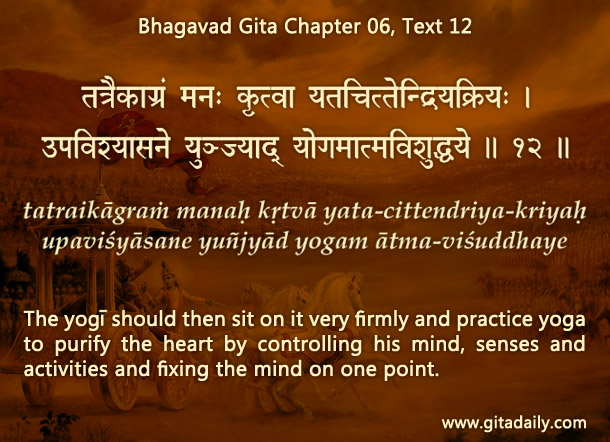Suppose we are sitting on a chair and studying. If the chair is twisted, the resulting discomfort may hinder our study. But if the chair is too comfortable, we may nod off.
Either way, if that is the only chair available, we will make do with it. But if we could choose, we would choose the chair with the comfort level that maximizes our concentration.
Consider the Bhagavad-gita (06.11-12) recommendation to go to a secluded place, sit at an appropriate height, use a deerskin as a mat and assume a yogic posture – all for pursuing purification. Such sitting might be initially difficult, but it serves the purpose of toughening the body and focusing the mind. But sitting contorted because of sitting on a damaged chair doesn’t serve any such purpose. Spiritual growth comes through purposeful austerity, not pointless discomfort.
Bhakti-yoga is eminently pragmatic – it centers on cultivating remembrance of Krishna, the most potent means for purification, and subordinating everything else to that purpose.
While practicing spiritual life, we may get caught in external considerations of comfort or discomfort. We may be proud of our ability to live austerely or discouraged at our inability to do so. Or we may become obsessed with the pursuit of comforts or disheartened at our inability to get them.
By remembering the purpose of purification, we can choose the comfort level that maximizes our focus on Krishna. We can accept comfort when it is available and favorable. And we can accept discomfort when it is inevitable and essential. Conversely, we can avoid comfort if it lulls us into complacency and lethargy. And we can avoid discomfort if it is unbearable and avoidable.
Overall, when we subordinate considerations of comfort and discomfort to the purpose of purification, we can keep growing spiritually through life’s ups and downs.
To know more about this verse, please click on the image
Explanation of article:
https://www.youtube.com/playlist?list=PLQ6SGXJ09m4XPG9kRCtZwpgZui6EtrWWs
Podcast:


Awesome. Every aspiring yogi’s state read and documented out of compassion for purification.